With the Republican and Democratic National Conventions complete and the nominees in place, the election season is in full swing. As a seminary professor and in my work as co-founder of the Clergy Emergency League, I talk with many pastors about the challenges of ministry in an election season.
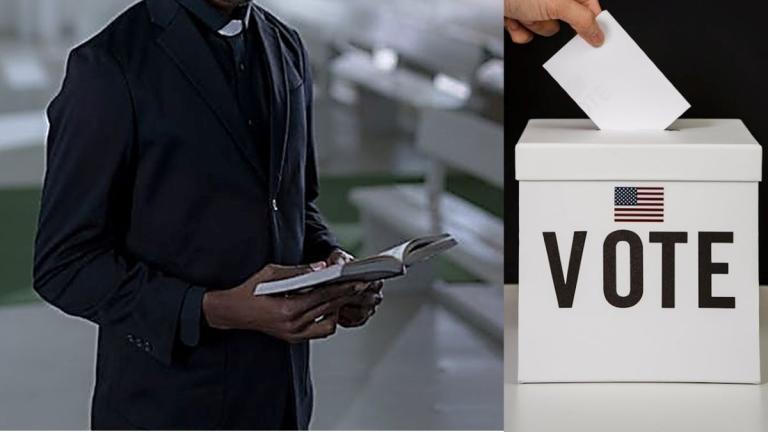
Many clergy wonder what they can and can’t say in their preaching and teaching during the election season.
I recently sat down with Rev. Breanna Illéné Director of Ecumenical Innovation & Justice Initiatives at the Wisconsin Council of Churches to talk about what clergy and congregations can say and do in an election season, and what they need to avoid to maintain their tax-exempt status. We also discussed how clergy and congregations can navigate tensions when addressing contemporary issues.
To watch the video of our conversation, click here.
Before getting into details about the church and politics, I’ll share a framework I developed for my book Preaching and Social Issues: Tools and Tactics for Empowering Your Prophetic Voice to help ministers choose which path works best for them and their context.
Assessment Tool for preaching and social issues
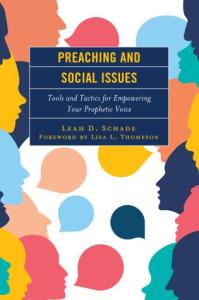
I developed an Assessment Tool for preaching and social issues which you can take here. This tool will help you think about your approaches to preaching and social issues using a three-dimensional questionnaire that measures: (1) your own vulnerabilities and strengths, (2) the characteristics of the congregation you serve, and (3) the quality of relationships within the congregation and between the congregation and yourself.
Gentle, Invitational, or Robust approaches
Based on the score of the Assessment Tool, I suggest three approaches to a sermon addressing a social issue: Gentle, Invitational, and Robust.
- The Gentle approach is for clergy who are in situations where there may be conflict, the congregation is new to sermons addressing social issues, or there is vulnerability on the part of the preacher.
- Invitational strategies are recommended for congregations that are ready for a more challenging message by way of dialogue and building bridges of listening, empathy, and understanding.
- The Robust approach is for clergy in congregations that are ready to be fully engaged in public theology and put their faith into action on social issues.
I’ll explain more about these approaches further on. For now, just keep these in mind as you’re considering ways to engage social issues during the election season.
Not this, but this
Churches are 501c3 organizations, which means they do not have to pay taxes as nonprofit charitable organizations. This classification, however, means that there are various things they are not allowed to do that would jeopardize their non-profit status.
At the same time there are ways for the church and preachers to address issues that affect their lives and communities. They can bring their religious teachings and ethics to bear and stay within the bounds of the law.
Churches cannot endorse candidates or give them money. That would violate their tax-exempt status.
However, congregations can educate and encourage people to engage in democracy by explaining how to vote, how to find info on registering to vote, where the polling place is, what will be on the ballot, and what the voter ID requirement is for their state.
Churches can also share nonpartisan voting guides about what is on the ballot and can participate in nonpartisan Get Out The Vote activities.
Also, in their sermons, pastors can remind people to vote. As Rev. Raphael Warnock, Senator from Georgia, said in a speech, “A vote is a kind of prayer for the kind of world we desire for ourselves and for our children. And our prayers are stronger when we pray together.”
Churches cannot allow a candidate to speak during a worship service. Not only would this violate their tax-exempt status, it would shift the focus away from worshiping God.
However, congregations can host a candidate forum – as long as all candidates are invited on an equal basis. They can also share the results of questionnaires about the candidates’ stances on issues, as long as all candidates are invited to participate.
Churches cannot print, distribute or post materials ranking candidates on issues or say, “they agree/disagree with us.”
But congregations can lobby on specific legislation. And they can advocate for or against specific bills that have been or could be introduced in the legislature.
Clergy cannot endorse candidates on behalf of a congregation.
However, clergy can speak about their own personal moral and ethical discernment about an issue, provided they clarify that they are not speaking on behalf of the congregation. In fact, my team’s research with thousands of clergy and congregation members since 2017 has shown that the majority of congregants want their pastors to provide biblical, theological, and ethical guidance on the issues that affect their lives.
Political events at your church
Churches often serve as community centers, and questions may arise about hosting political events. Legally, if you allow one political party to use your space, you must be willing to extend that opportunity to all parties.
However, it’s also important to consider the pastoral implications. What message does this send to your community and congregation? Transparent communication with your governing body and congregation is key to navigating these decisions.
Members running for office
If someone in your congregation, or even the pastor, is running for political office, it’s important to maintain clear boundaries. The church should not be used as a platform for political campaigns. Instead, political activities should be kept separate from church functions to avoid any perception of endorsement.
Encourage nonpartisan involvement
There are many ways for churches to be involved in the political process without aligning with a particular party. Churches can offer their spaces as polling locations. Clergy and members can also volunteer as poll chaplains or election observers to ensure a peaceful and transparent voting process.
Utilize resources for liturgy, prayer, and preaching
The Wisconsin Council of Churches and the Clergy Emergency League have developed and curated resources for worship, prayer, and sermons to help churches navigate the election season. The “Loving Your Neighbor in an Election Season” campaign offers worship resources and guidance for engaging with political matters in a faith-informed way. Worship expert Marcia McFee has also developed a liturgy and sermon series for the election season called “Do Unto Others.”
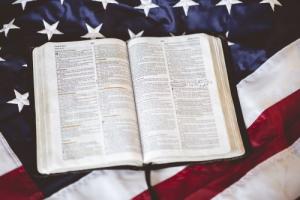
Political, yes! Partisan, no.
In my book, Preaching in the Purple Zone: Ministry in the Red-Blue Divide, I explain that there is a difference between politics in the original sense of the word (concerns of the polis, the community) and partisan politics (concerns of a particular political party). Undoubtedly, the pulpit should not be a tool for any political party to use toward its own ends, or for a preacher to push their own partisan agenda.
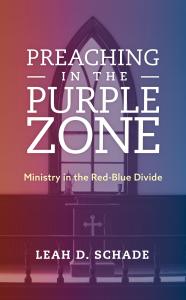
At the same time, it’s incorrect to insist that the gospel has nothing to say about contemporary issues or current events. In fact, the biblical writers themselves engaged the contemporary issues of their day, such as immigration, wealth distribution, and access water and land. Thus, it is not only acceptable but necessary for faith leaders to bring a biblical and theological lens to examine the contemporary topics of our time.
As UCC Justice and Witness Ministries, Bernice Powell Jackson explains, “Politics is about the values we honor, the dollars we allocate and the process we follow so that we can live together with some measure of justice, order and peace.”
What’s your approach?
Returning to the Gentle, Invitational, and Robust approaches for sermons addressing social issues, I suggest three strategies for each, a total of nine in all. I’ll share more about this in a future article, but for now, here are the nine strategies:
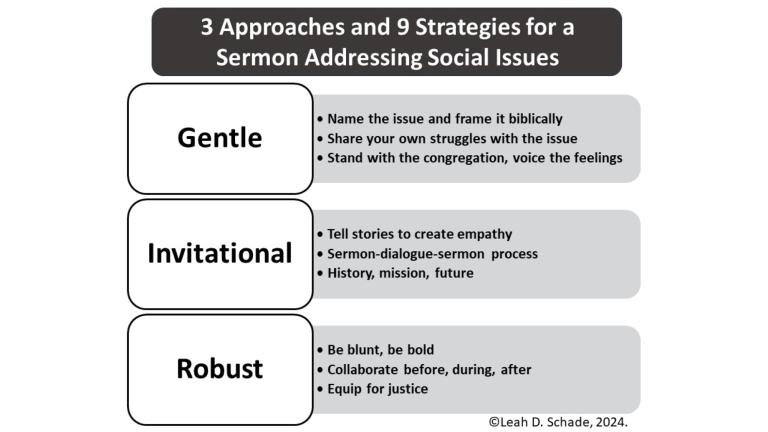
These different strategies can be used for addressing biblical, theological, and ethical principles in an election season sermon.
Biblical, theological, and ethical themes for an election sermon
In an article for Third Act Faith, the Rev. Dr. Jim Antal, Special Advisor on Climate Justice to UCC General Minister and President, has suggested four themes a preacher might explore in an election sermon. Each theme has accompanying questions for the preacher and congregation to be in dialogue about. I’ve adapted and summarized them here:
1 – God values all people
How do the candidates’ past record and current promises support care for the most vulnerable among us?
2 – The common good
In what ways do the candidates preserve and advance justice while promoting the common good?
3 – Care for our common home
How do candidates’ proposed policies and past practices protect and preserve the planet we share?
4 – Honesty and truth
What do candidate’s advertising, endorsements and other campaigning reveal about their commitment to being honest and telling the truth?
As Antal explains, “All of these activities are political because they involve how people relate to each other, how people govern their lives together. Jesus, like the prophets in every tradition, tells the truth as he seeks to amplify love and expand justice in families, in towns and throughout the empire.” So, too, we should expect the same from our elected officials.
How to prepare for an election sermon
As you’re thinking about your election sermons, here are three suggestions for preparing yourself and your congregation.
Communicate with church leadership
Before embarking on any social or political engagement, it’s essential to communicate with your church’s governing body, such as the Council or Board of Elders. This isn’t about seeking permission but ensuring transparency. Let them know what you plan to do and invite their feedback. This keeps everyone informed and prevents any surprises.
Address potential concerns
If you anticipate negative reactions from certain members of your congregation, it’s wise to address these concerns proactively. Reach out to them before beginning your work on the sermon for conversation and listening. Express your sense of calling to address the issue while also valuing their perspectives. This approach not only honors their views but also fosters a space for honest dialogue.
Consult with colleagues
Talk with clergy colleagues or your mentor about your sermon. Test-drive your ideas and ask for suggestions. This can help you refine your message and approach, ensuring that it resonates with your congregation.
Final thoughts
The separation of church and state is a foundational principle, but it doesn’t preclude people of faith from speaking out on issues of justice and morality. Churches can and should engage in public discourse, provided they do so with transparency, respect for boundaries, and a commitment to the common good.
As I encourage readers in Preaching and Social Issues:
Preach in a way that proclaims who God is, what God has done and is doing now, and what this means for our lives in community today.
Lift up the “big questions” that underlie the headlines or controversies.
Acknowledge the complexities of individual human sin, as well as systemic evil, then frame these questions biblically and theologically.
Be fair and avoid creating “straw men” or taking cheap shots against those who you believe to be on the “wrong” side of an issue.
Through empathy, authenticity, and rhetorical tactics that engage different perspectives, preachers can help listeners encounter the gospel that will, through God’s transformative power, be life-giving, hope-building, and world-changing.
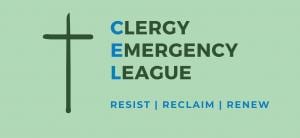
The Clergy Emergency League and Wisconsin Council of Churches will be hosting a four-part webinar series on Clergy and Congregations Navigating the Election Season in September and October. I’ll be leading one on “Discovering Your Congregation’s Theologies of Conflict” on Sept. 17, 7:00 p.m. Register here.
Read also:
Preaching 2024 Election – How will Clergy Navigate Issues?
Ideas for Clergy Dealing with Pre-Election Stress
Walz’s “Mind Your Own Damn Business” is Actually Biblical
3 Old Testament Passages about the Tyranny of Kings
3 New Testament Messages for Resisting Autocracy

The Rev. Dr. Leah D. Schade is the Associate Professor of Preaching and Worship at Lexington Theological Seminary in Kentucky and ordained in the ELCA. Dr. Schade does not speak for LTS or the ELCA; her opinions are her own. She is the author of Preaching and Social Issues: Tools and Tactics for Empowering Your Prophetic Voice (Rowman & Littlefield, 2024), Preaching in the Purple Zone: Ministry in the Red-Blue Divide (Rowman & Littlefield, 2019) and Creation-Crisis Preaching: Ecology, Theology, and the Pulpit (Chalice Press, 2015). She is the co-editor of Rooted and Rising: Voices of Courage in a Time of Climate Crisis (Rowman & Littlefield, 2019). Her newest book is Introduction to Preaching: Scripture, Theology, and Sermon Preparation, co-authored with Jerry L. Sumney and Emily Askew (Rowman & Littlefield, 2023).













